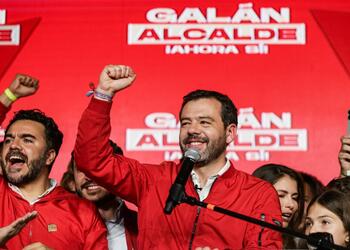After a sweeping first-round victory, Carlos Fernando Galán, the newly elected mayor of Bogotá, Colombia, faces a severe security crisis, with some of the largest criminal threats in the country increasingly active in the capital.
Galán, who won the October 29 elections with 49% of the vote, based his campaign around improving security in the Colombian capital. Under the slogan “Bogotá walks safely,” the liberal candidate proposed an “Integral Plan against Organized Crime” and a program to strengthen criminal and judicial investigations.
“We have a lot of work to do, and I want to mention some of the tasks for Bogotá that start today: first, we will concentrate on protecting this city. The levels of fear must go down and they are going to go down,” Galán said in his victory speech.
SEE ALSO: Colombian Mayors at a Crossroads: Co-Govern With Criminals or Flee
Galán’s main challenge will be to manage the current security crisis — the worst the city has seen in the last four years. According to data published by the Bogotá City Council, seven out of 12 high-impact crimes increased in the first half of 2023 compared to last year. Kidnapping, theft, and residential burglary saw the highest increases, rising 80%, 29.7% and 27.2%, respectively.
As the country’s capital, Bogotá is a key location for organized crime networks engaging in micro-trafficking, extortion, and money laundering. It is also a strategic corridor for moving precursor chemicals and drugs that are sold in the city for retail consumption and distributed to other parts of the country.
According to data from the Colombian Drug Observatory (Observatorio de Drogas de Colombia- ODC), a Ministry of Justice agency that researches the drug problem in Colombia, nearly 50 tons of cocaine hydrochloride and marijuana were seized in Bogotá between 2019 and 2023.
InSight Crime Analysis
Galán faces a wide range of criminal groups operating throughout the city. His administration must move away from focusing mainly on the weakest links in organized crime networks, a strategy favored by prior governments.
Neighborhoods such as Kennedy and Ciudad Bolívar have seen increased activity by sophisticated groups such as Venezuelan gang Tren de Aragua and the Gaitanist Self-Defense Forces of Colombia (Autodefensas Gaitanistas de Colombia – AGC). Their increased control over parts of Bogotá has led to a rapid rise in extortion, contract killings, and kidnappings.
Tren de Aragua is allegedly responsible for several murder cases in the Colombian capital, where it has established itself as part of a growing transnational presence. These murders received a lot of attention due to the extreme levels of violence involved.
SEE ALSO: Gaitanistas and Tren de Aragua Unlikely to War Over Bogotá, Colombia
While InSight Crime has questioned the extent of the AGC and Tren de Aragua’s actual control in Bogotá and the likelihood of a turf war between them, these threats merit further investigation by the incoming mayor.
Likewise, the Ombudsman’s Office has also warned that other criminal such as the ex-FARC mafia, dissidents of the extinct Revolutionary Armed Forces of Colombia (Fuerzas Armadas Revolucionarias de Colombia – FARC) guerrillas, the National Liberation Army (Ejército de Liberación Nacional – ELN) may position themselves in the capital’s rural districts, filling a power vacuum left by the FARC after their demobilization in 2016.
One of Galán’s most significant proposals is the creation of a branch of the Financial Information and Analysis Unit (Unidad de Información y Análisis Financiero – UIAF) for Bogotá. This would create a collaborative network made up of court officials, the Attorney General’s Office, and the national police, ideally increasing the city’s ability to go after the economic structures propping up criminal groups.
In response, Galán has proposed establishing weekly security councils and strengthening police presence, especially in urban areas. However, the mayor-elect’s program so far lacks a clear strategy to address the threats posed by organized crime in rural areas, which make up 75% of the capital’s territory.

